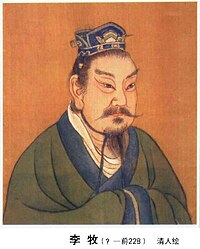Li Mu
| Li Mu | |
|---|---|

A Qing dynasty portrait of Li Mu
|
|
| General of the Zhao state | |
| Born | (unknown) |
| Died | 229 BC |
| Names | |
| Traditional Chinese | |
| Simplified Chinese | |
| Pinyin | Lǐ Mù |
| Wade–Giles | Li Mu |
Li Mu (died 229 BC) was a general of the Zhao state during the Warring States period of Chinese history. He was named by Chinese historians as one of the four greatest generals of the Warring States period, along with Bai Qi, Wang Jian and Lian Po.
Li Mu assumed command of Zhao's overall security situation after the death of Zhao She and the exile of Lian Po, both renowned former generals of Zhao. He began his career on the northern frontier fighting the Xiongnu. He adopted an extremely defensive strategy, was accused of cowardice and replaced by a more aggressive general who was defeated every time he attacked the Xiongnu. Li Mu was recalled and given a much larger army. He concealed his troops and played the coward. When a large force crossed the border, Li Mu surrounded and smashed it. He then went on to defeat the Tan Lan, Lin Hu and Donghu. It was said that the Xiongnu did not dare approach the border for the next twenty years.
Later, as the threat from Qin increased with the ascension of Qin Shi Huang, he turned his focus more to the western parts of Zhao. The State of Zhao was merely a shadow of its former self. After suffering utter defeat from Qin during the Battle of Changping, in which Zhao had lost virtually its entire army, most of core Zhao territories had fallen to Qin. Furthermore, Zhao was diplomatically isolated as the Kingdoms of Wei, Yan and Han were too weak to offer any kind of support, while Qi and Chu were more willing to see the kingdom extinguished than face the powerful Qin.
However, Li Mu could still hold out against the much stronger Qin forces. So while Qin could raid Wei and Han at will, they had a much harder time pillaging in Zhao.
Getting rid of Li Mu became a necessity for Qin to conquer Zhao and unify China. Qin sent spies to the Zhao court, bribing key courtiers in order to persuade the King of Zhao that Li Mu was planning to revolt. The plan succeeded - Li Mu was arrested and soon executed on the king's orders. According to Sima Qian (chapter 102) this happened when King Qian, 'whose mother was a dancing girl', came to the throne.
...
Wikipedia
